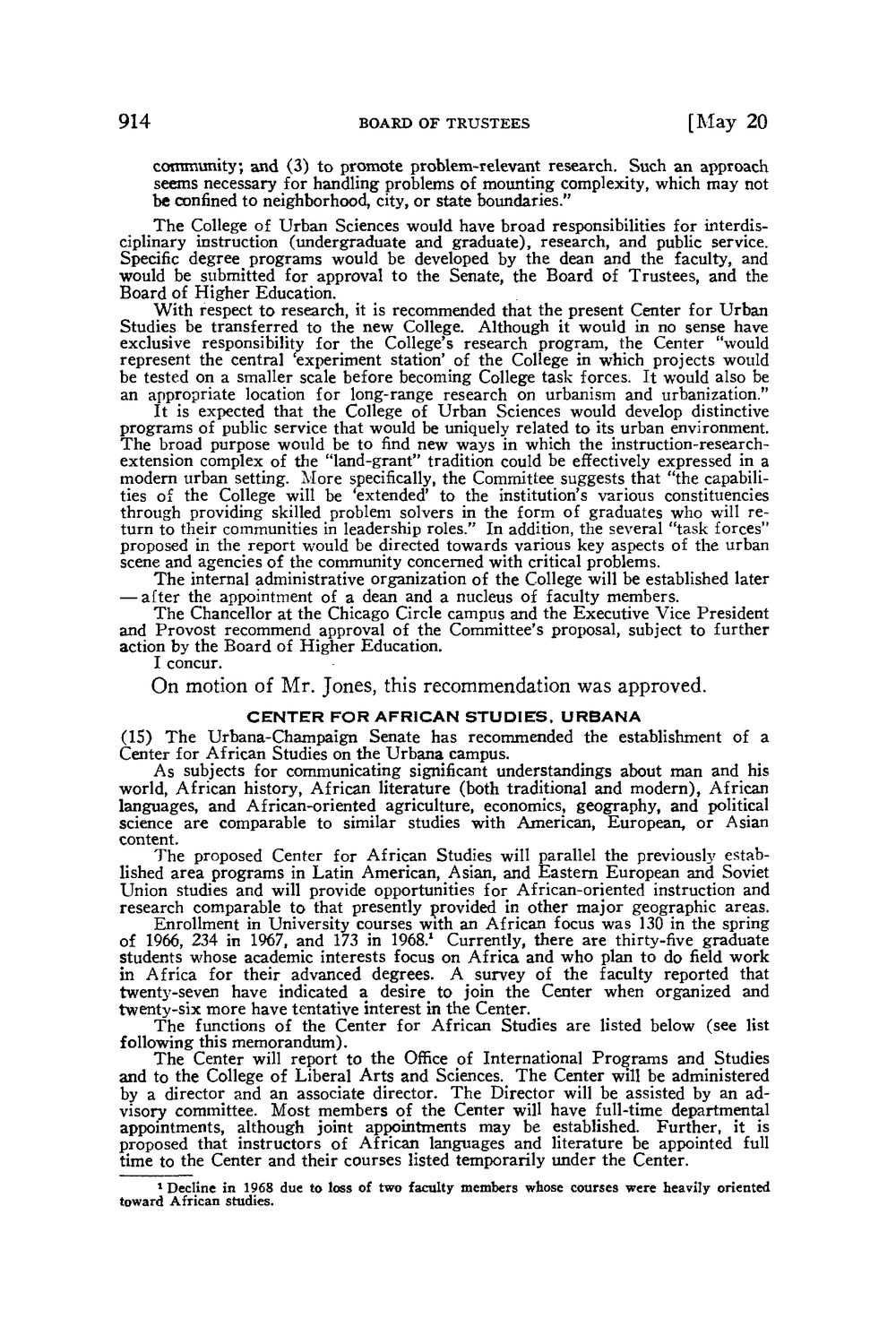| |
| |
Caption: Board of Trustees Minutes - 1970
This is a reduced-resolution page image for fast online browsing.

EXTRACTED TEXT FROM PAGE:
914 BOARD OF T R U S T E E S [May 20 community; and (3) to promote problem-relevant research. Such an approach seems necessary for handling problems of mounting complexity, which may not be confined to neighborhood, city, or state boundaries." T h e College of Urban Sciences would have broad responsibilities for interdisciplinary instruction (undergraduate and graduate), research, and public service. Specific degree programs would be developed by the dean and the faculty, and would be submitted for approval to the Senate, the Board of Trustees, and the Board of Higher Education. With respect to research, it is recommended that the present Center for Urban Studies be transferred to the new College. Although it would in no sense have exclusive responsibility for the College's research program, the Center "would represent the central 'experiment station' of the College in which projects would be tested on a smaller scale before becoming College task forces. It would also be an appropriate location for long-range research on urbanism and urbanization." It is expected that the College of Urban Sciences would develop distinctive programs of public service that would be uniquely related to its urban environment. The broad purpose would be to find new ways in which the instruction-researchextension complex of the "land-grant" tradition could be effectively expressed in a modern urban setting. More specifically, the Committee suggests that "the capabilities of the College will be 'extended' to the institution's various constituencies through providing skilled problem solvers in the form of graduates who will return to their communities in leadership roles." In addition, the several "task forces" proposed in the report would be directed towards various key aspects of the urban scene and agencies of the community concerned with critical problems. T h e internal administrative organization of the College will be established later — after the appointment of a dean and a nucleus of faculty members. The Chancellor at the Chicago Circle campus and the Executive Vice President and Provost recommend approval of the Committee's proposal, subject to further action by the Board of Higher Education. I concur. On motion of Mr. Jones, this recommendation was approved. CENTER FOR AFRICAN STUDIES, URBANA (IS) T h e Urbana-Champaign Senate has recommended the establishment of a Center for African Studies on the Urbana campus. As subjects for communicating significant understandings about man and his world, African history, African literature (both traditional and modern), African languages, and African-oriented agriculture, economics, geography, and political science are comparable to similar studies with American, European, or Asian content. The proposed Center for African Studies will parallel the previously established area programs in Latin American, Asian, and Eastern European and Soviet Union studies and will provide opportunities for African-oriented instruction and research comparable to that presently provided in other major geographic areas. Enrollment in University courses with an African focus was 130 in the spring of 1966, 234 in 1967, and 173 in 1968.1 Currently, there are thirty-five graduate students whose academic interests focus on Africa and who plan to do field work in Africa for their advanced degrees. A survey of the faculty reported that twenty-seven have indicated a desire to join the Center when organized and twenty-six more have tentative interest in the Center. The functions of the Center for African Studies are listed below (see list following this memorandum). The Center will report to the Office of International Programs and Studies and to the College of Liberal Arts and Sciences. T h e Center will be administered by a director and an associate director. The Director will be assisted by an advisory committee. Most members of the Center will have full-time departmental appointments, although joint appointments may be established. Further, it is proposed that instructors of African languages and literature be appointed full time to the Center and their courses listed temporarily under the Center. 1 Decline in 1968 due to loss of two faculty members whose courses were heavily oriented toward African studies.
| |